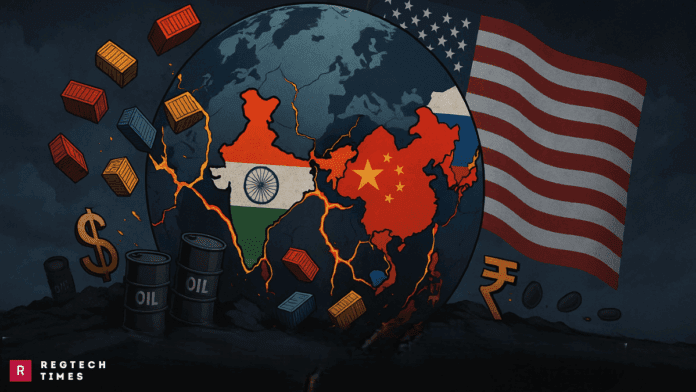A powerful new bill in the United States Senate is stirring up strong reactions worldwide. Called the Sanctioning Russia Act of 2025, this bill could change how countries like India and China trade with the U.S.
The bill is being strongly pushed by Senator Lindsey Graham. He has described it as an “economic bunker buster” that would hit hard at Russia—and at nations helping Russia’s economy by buying its energy.
The core idea of the bill is to punish Russia for its ongoing invasion of Ukraine. But it doesn’t stop there. It also targets countries that continue to buy Russian oil and uranium. If passed, the bill would force the U.S. President to place a massive 500% tariff on any goods or services coming from such countries.
One key line from the bill reads:
“The President must increase the rate of duty on all goods and services imported into the United States from countries that knowingly engage in the exchange of Russian-origin uranium and petroleum products to at least 500%.”
This means if any country keeps buying oil or uranium from Russia, everything they try to sell to the U.S. would be taxed at a rate five times higher than normal.
The bill also includes:
- Sanctions on Russian leaders, banks, and military contractors
- A ban on U.S. energy exports to Russia
- Severe penalties if Russia escalates the war or blocks peace efforts
Senator Graham said, “I’ve got 84 co-sponsors for a Russian sanctions bill that is an economic bunker buster against China, India, and Russia for Russia’s brutal invasion of Ukraine. I think that bill’s going to pass.”
He also issued a stern warning:
“To China and India: if you continue to prop up Putin’s war machine, you’ll have nobody to blame but yourself.”
Why India and China Are Being Targeted
India and China are among the countries that have increased their oil imports from Russia, even as the Ukraine war continues.
Russia has now become India’s top oil supplier, overtaking countries like Saudi Arabia and Iraq. In June, Indian oil imports from Russia reached nearly 2 to 2.2 million barrels per day, marking a new high over the last two years.
This comes during a time of instability in the global oil market, caused partly by Israel’s offensive actions against Iran. With prices rising and supply chains strained, Indian refiners have found Russian oil more accessible—even if not always cheaper.
India’s External Affairs Minister S. Jaishankar has defended these purchases. He has said repeatedly that India has limited options, and Russian oil simply offers the best available deal under current global conditions.
Prime Minister Narendra Modi has also stated clearly that this is not “an era of war.” While India has not directly supported the conflict, it has chosen to act in its national interest.
However, the U.S. bill doesn’t make room for neutral positions. Senator Graham’s comments show that lawmakers in Washington see energy purchases from Russia as indirect support for the war.
China, too, has grown its oil trade with Russia. Like India, it could face steep U.S. tariffs if the bill passes.
Global Trade Could Face a Major Shock
If the Sanctioning Russia Act of 2025 becomes law, it could disrupt global trade in a big way.
The proposed 500% tariff would apply to all goods and services coming into the U.S. from countries that continue to buy Russian oil or uranium. That includes not only fuel, but also products like:
- Smartphones
- Clothing
- Cars and auto parts
- Machinery
- IT services
For a country like India, which has a major trade relationship with the U.S., this could have serious economic consequences. The same goes for China, which already faces trade tensions with the U.S. on multiple fronts.
Meanwhile, Russia and Ukraine have made little progress in peace talks. In a recent meeting in Istanbul, both sides agreed to another prisoner exchange, but no breakthroughs were reported on ending the war.
U.S. President Donald Trump has not commented on the bill yet. But with strong bipartisan backing in the Senate—84 co-sponsors already—the bill could soon move to a vote.
If passed, this act may turn energy trade into a pressure point that forces countries to choose between their oil deals with Russia and their broader trade ties with the United States.
